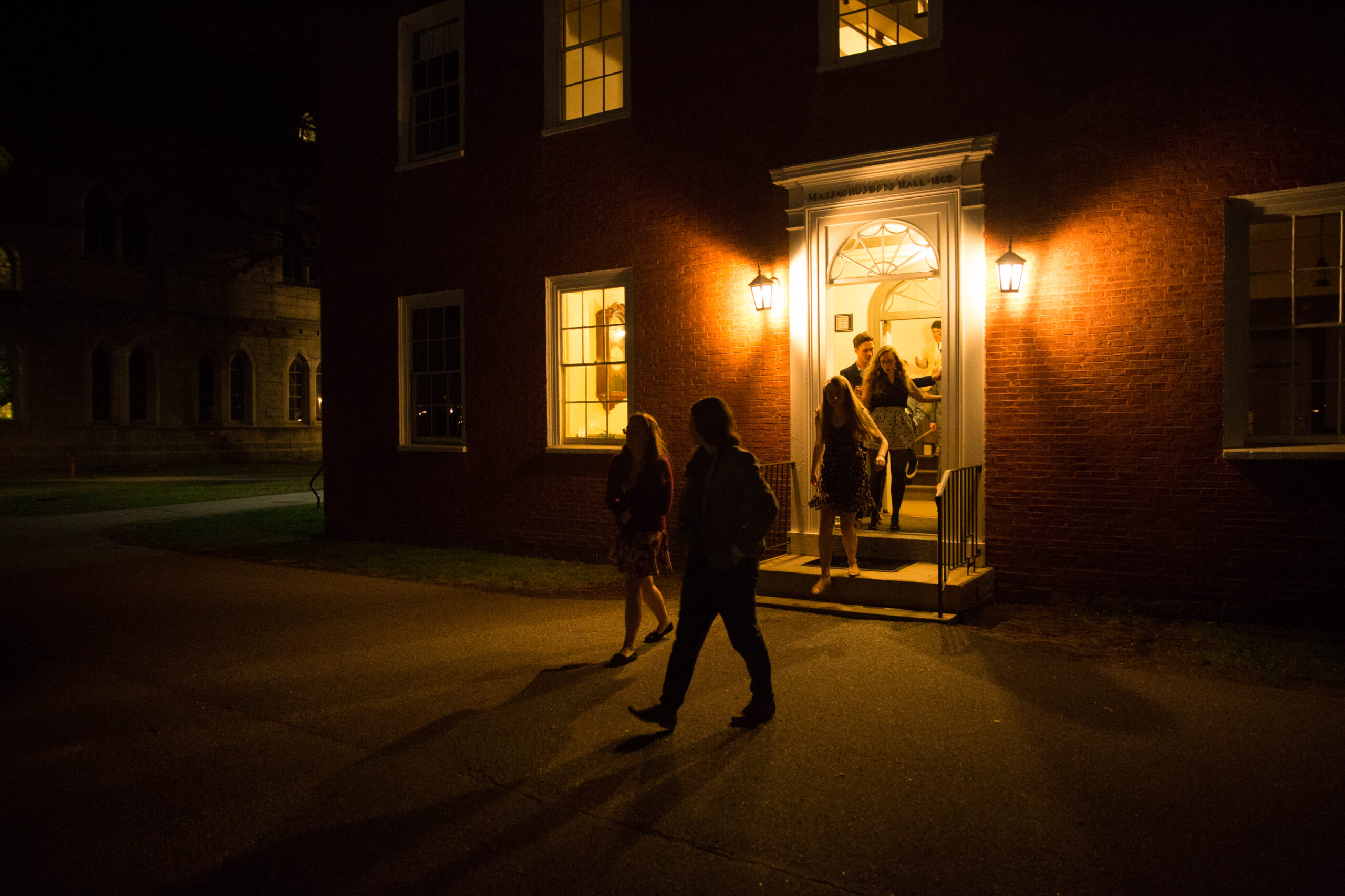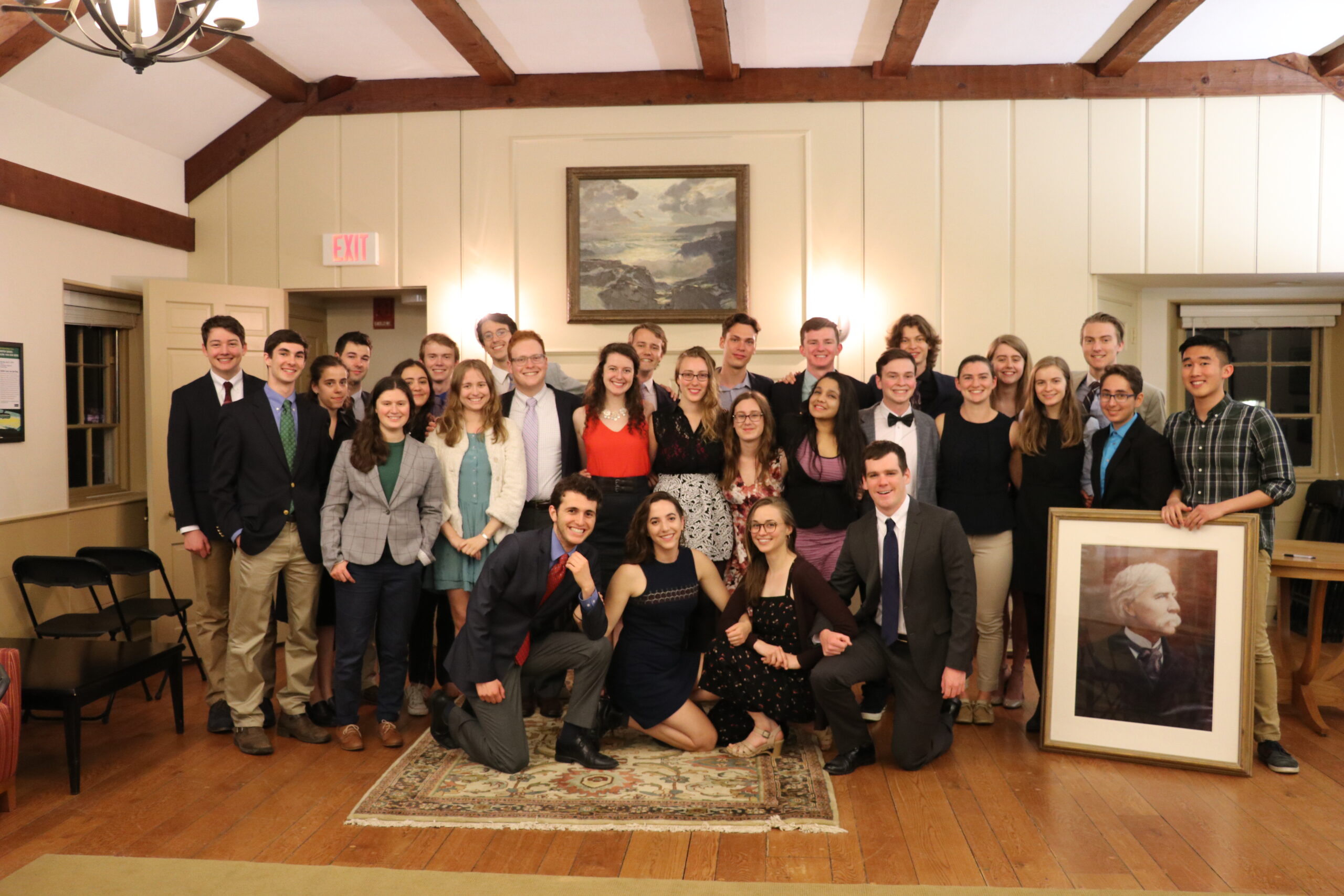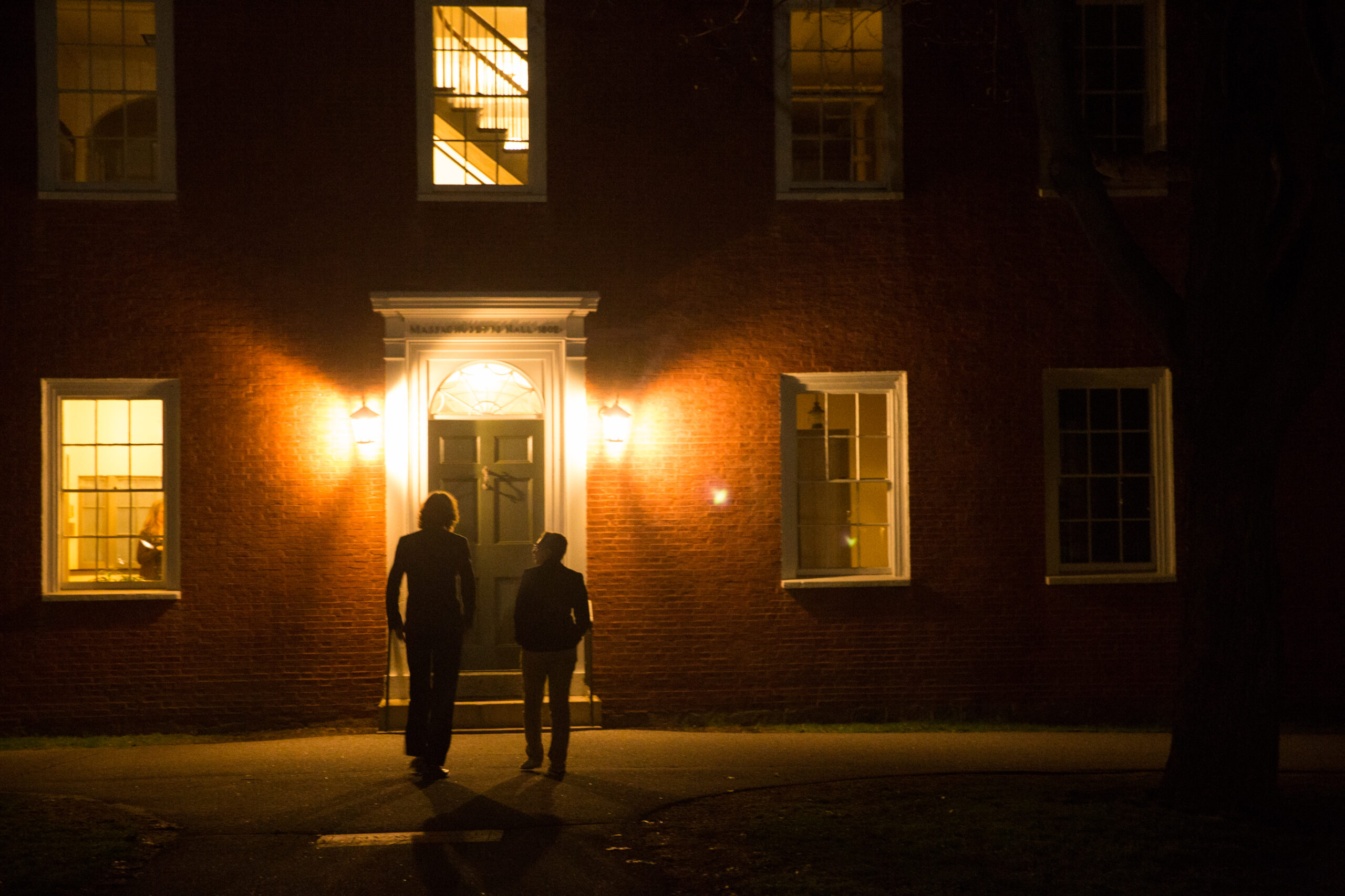Among the pines with the Peucinian Society
The College’s oldest literary society is alive and well
May 4, 2018
 Ann Basu
Ann BasuIshani Agarwal ’20 says she came to Bowdoin “blind.” An international student from Mumbai, India, Ishani gleaned everything she knew about Bowdoin from pamphlets and the internet. Once transplanted to campus and settled in small-town Maine, Agarwal wondered about a lot of things. Among them: why everything in America has to be “this or that.”
“It’s really easy to feel like everyone pigeonholes politics really quickly,” Agarwal said. “Are you liberal, are you conservative—are you left, are you right.”
Luckily, for Agarwal, she found a middle ground in a perhaps unlikely place: the Peucinian Society, Bowdoin’s oldest literary club. Founded in 1805 by a smattering of eight students, the Peucinians occupy a particular role on campus. Often found gracing SuperSnack in formal attire on Thursday nights or reading the Iliad cover-to-cover on the museum steps, the group prides itself in its mission: unwavering in its commitment to “utmost respect, lasting friendships, and above all, free inquiry.”
Free inquiry. It’s the subject of serious debate on college campuses today. It’s also the title of a “Statement of Principles” signed by 53 Middlebury faculty after a group of 100 students prevented controversial visiting speaker Dr. Charles Murray from delivering a talk in March of 2017. Afterwards, a group of instigators thronged the speaker, injuring one member of the faculty. First published in the Wall Street Journal on March 7, 2017, the first principle reads: “Genuine higher learning is possible only where free, reasoned, and civil speech and discussion are respected.”
At Bowdoin, the term feels almost as obsolete as Homer. Part-literary, part-oratory, the Peucinians might be one of the few places on campus where far-right conservatives and radical liberals can be friends. A fair number of them, Agarwal tells me, even live together.
“A lot of people wonder, ‘Where are the conservatives who are going to come out and speak?’ A lot of them are at Peucinian,” said president Sam Lewis ’19. “I think it’s because they know that this is a place where they can speak freely and they are not going to be judged as a person because of it. And so we have these interesting topics and we have people saying things that you won’t hear anybody say on campus.”
 Gwen Davidson
Gwen DavidsonAt the beginning of each disputation, members make a toast. “Pinos loquentes,” the president recalls the Latin motto. “Semper habemus,” members respond and raise their cups—to friendship, to free discourse, to tradition. English: “We always have the whispering pines.”
The phrase connects the club to Bowdoin’s physical landscape, one of the few major mainstays since the society’s inception. Though several of the College’s buildings and libraries, including the Peucinian’s former home, have endured fire and reconstruction over the years, the pines that root the club’s sense of place remain.
Alongside numerous other time-honored traditions—such as peripatos, a mid-disputation stroll around the quad—the Peucinian Society has a deep intellectual history at Bowdoin that precedes some of the society’s iconic heavyweights. Henry W. Longfellow, Joshua Chamberlain and Sen. George Evans all held the emblematic Peucinian pine bough at initiation; the Athenaean Society, Peucinian’s rival literary club, boasted Franklin Pierce and Nathaniel Hawthorne.
Back then, the Peucinian Society was a book circulation club that arose from a dissatisfaction with the College library’s collection. It was available only for consultation (think: Special Collections) from noon to 1 p.m. a couple of days a week. Disavowing popular or fictional texts, the collection boasted mostly classics, history and the largest collection of scripture north of Boston for its time. By the 1820s, the Peucinian had formed a rivalry with the Athenaean Society, and a the “race for volumes” intensified their bookish tug-of-war. Before the societies phased out at the turn of the 20th century with the advent of fraternities, the Peucinian Society had collected approximately 1,000 volumes and disputated on a fortnightly basis.
But the two brother societies also had marked partisan bents, political predilections that the modern-day Peucinians seem to have consolidated into one. “Never were Jew and Samaritans more separated than Athenaeans and Peucinians,” wrote John Abbot ‘1825 in a letter to a family member. Rumor had it that the Peucinians were Federalist Whigs; the Athenaeans, Democrats.

“We know that the Peucinians voted that they thought that black people should have the right to vote in the 1820s,” said Lewis.
“They voted that Bowdoin should be co-educational—or it might have been that women have the same intellectual capabilities as men,” he said.
By the turn of the 20th century, the society had fallen silent. The question that Lewis referenced—whether women have the same intellectual capabilities as men—was actually a disputation topic in 2007, when the society was re-founded after a century of radio silence. Bowdoin had integrated women into its student body over 30 years earlier, and the Peucinian Society—recently revived by three students captivated by political theory after a seminar with Professor Paul Franco—was still majority male.
At that disputation, the society met in the Peucinian room to debate “the merits of feminism and gender equality,” which records show centered on “the ways in which men and women are equal and unequal” and emerged inconclusive: “We did not reach a consensus regarding whether the differences between men and women are physical or both physical and mental,” the chronicler at the time wrote.
In some ways, disputation topics of days old are not a far cry from those of today’s disputations, which focus on a spectrum of debates. They range from monogamy to the removal of confederate statues (consensus from that topic was a tie). Yesterday evening, the society discussed whether compulsory military service is immoral.
“[Disputations] are not just questions about practical world affairs,” said Agarwal. “They’re also questions about how we should live our lives.”
This is easier said than done when the role of “devil’s advocate” does not exist within the confines of the faculty lounge of Massachusetts Hall on Thursday evenings, when the Peucinians gather for their weekly debate.
“It’s always from the heart,” said Ben Ratner ’19, this year’s Master of Sessions. “It really helps blend the social and the intellectual because you know that everyone around the table is speaking from themselves rather than just hiding behind an argument. It’s really like, this is me, reckon with me, speak with me, discuss with me, know who I am.”
“We are a place where no matter what your political views, you are welcome here,” said Lewis. “We have people who are open Trump supporters. We have conservatives. We have Marxists and radical feminists and neoliberals and you name it—people who don’t identify with labels, real free thinkers.”
It can be a tough balance: letting opinions be heard while maintaining an atmosphere of respect and decency. But for the Peucinians, it seems, that very tension is often the basis of lifelong friendship.
“It is difficult to separate ideas from someone’s character, but a big part of the Society is integrity beyond intellectual integrity. ‘Do you treat people with respect?’ said Ratner. “That is perhaps more fundamental than just the intellectual exploration. ‘Do you treat someone else as both your intellectual and human equal? Not just a sparring partner, not just someone who holds despicable beliefs, but another person in all their complexity.’”
As the gavel falls and the Peucinians wrap up their final disputation of the semester, it’s clear that the club’s days of yore are gone, but not forgotten. No longer a secret society or a boy’s club, the Peucinians hearken back to the past still: in their references to antiquity, commitment to respect, friendship and, of course, freedom of thought. If all else fails, as their motto makes certain, they will always have the whispering pines.
Comments
Before submitting a comment, please review our comment policy. Some key points from the policy:
- No hate speech, profanity, disrespectful or threatening comments.
- No personal attacks on reporters.
- Comments must be under 200 words.
- You are strongly encouraged to use a real name or identifier ("Class of '92").
- Any comments made with an email address that does not belong to you will get removed.

Homer is hardly obsolete.
How is this not a self-selecting, self-perpetuating social organization?
Who says it isn’t? What is wrong with students joining an intellectual group by their own volition (“self-selecting”)? And is there something objectionable about trying to continue to exist (“self-perpetuating”)?
How is Bowdoin not a self-selecting, self-perpetuating organization?
I think that Kimberly’s point is that the Social Code was changed in 1997 to say that students joining “self-selecting, self-perpetuating social organizations” could be punished with reprimands or sanctioned with the possibility of expulsion. The changes were added to kill off the existing literary societies, Greek organizations, and fraternities at Bowdoin. Her question is how is the Peucinian Society, which sounds like a great organization and by your own account as a Peucinian member (based on the screen name you chose) an organization that is a self-selecting and self-perpetuating organization, allowed to continue to exist and take in members at Bowdoin since 2007 while membership in similar societies and organizations remains punishable at Bowdoin? Has the Social Code changed?
T.C. –
Thanks for the clarification. Looking at the “Fraternity Membership Policy” (http://www.bowdoin.edu/studentaffairs/student-handbook/college-policies/fraternity-membership-policy.shtml), the ban seems to apply to “private, selective-membership social organizations,” which would include fraternities. However, (and this is an actual answer to Kimberly, whose question I now understand was not provocative), the Peucinian Society is not private nor is it selective in membership. The club is registered with Student Activities and has open meetings.